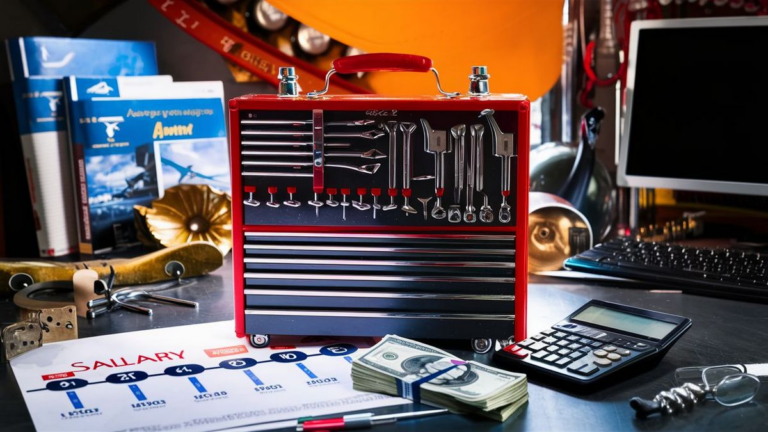Are you considering a career as an aircraft mechanic and wondering about the potential earnings? Aircraft mechanics play a crucial role in ensuring the safety and functionality of airplanes, helicopters, and other aircraft. In this article, we will delve into the topic of how much aircraft mechanics make annually.
The Importance of Aircraft Mechanics
Before discussing salaries, it’s essential to understand the significance of aircraft mechanics. These professionals are responsible for inspecting, repairing, and maintaining aircraft to ensure they operate safely and efficiently. Their meticulous work helps prevent accidents and ensures the smooth operation of the aviation industry.
Factors Affecting Salary
Several factors influence the salary of aircraft mechanics. Experience, location, industry, and employer are among the primary determinants. Mechanics with more experience and specialized skills often command higher salaries. Additionally, working for airlines or government agencies may offer different salary structures compared to private maintenance companies.
Salary Range
The salary range for aircraft mechanics can vary widely. According to data from the Bureau of Labor Statistics (BLS), the median annual wage for aircraft mechanics and service technicians was $64,310 as of May 2020. However, salaries can range from around $39,820 for the lowest 10 percent to over $100,790 for the highest 10 percent.
Industry Comparison
Aircraft mechanics may work in various industries, including scheduled air transportation, aerospace product and parts manufacturing, and government agencies. The industry they choose can significantly impact their earning potential. For example, those working in aerospace manufacturing tend to earn higher salaries compared to those in other sectors.
Location
Location plays a crucial role in determining aircraft mechanics’ salaries due to differences in living costs and demand for services. Metropolitan areas and regions with a high concentration of aviation activities may offer higher wages to attract skilled professionals.
Job Outlook
The job outlook for aircraft mechanics is generally positive. The BLS projects a 5% growth in employment for aircraft and avionics equipment mechanics and technicians from 2020 to 2030. As air travel continues to expand, the demand for skilled mechanics to maintain and repair aircraft is expected to remain strong.
Education and Training
Most aircraft mechanics pursue formal education and training through FAA-approved aviation maintenance technician schools. These programs typically last 18 to 24 months and cover subjects such as aircraft systems, maintenance procedures, and safety regulations. Additionally, mechanics must obtain FAA certification to perform maintenance on aircraft.
In conclusion, aircraft mechanics play a vital role in ensuring the safety and reliability of aircraft. While salaries can vary depending on factors such as experience, location, and industry, skilled mechanics can expect competitive wages and opportunities for career advancement in the aviation industry.
Frequently Asked Questions
Here are some commonly asked questions about aircraft mechanics:
| Question | Answer |
|---|---|
| 1. How long does it take to become an aircraft mechanic? | The duration varies depending on the type of education and training pursued. Most formal programs offered by FAA-approved aviation maintenance technician schools last between 18 to 24 months. |
| 2. What are the prospects for career advancement in this field? | With experience and additional certifications, aircraft mechanics can advance to supervisory or managerial roles. They can also specialize in specific aircraft systems or pursue roles in quality control. |
| 3. Are there any risks associated with being an aircraft mechanic? | While aircraft mechanics undergo extensive training in safety procedures, there are inherent risks associated with working with aircraft, such as exposure to hazardous materials and working at heights. However, strict safety protocols are in place to mitigate these risks. |
Benefits of Being an Aircraft Mechanic
Aside from competitive salaries, there are several benefits to pursuing a career as an aircraft mechanic:
- Job stability: The demand for skilled aircraft mechanics remains strong, providing job security even during economic fluctuations.
- Opportunities for travel: Aircraft mechanics may have the chance to travel for maintenance work or to attend training programs.
- Professional satisfaction: Knowing that their work directly contributes to aviation safety and efficiency can be highly rewarding for aircraft mechanics.
Specializations in Aircraft Maintenance
As aircraft become more advanced, there is a growing demand for specialized skills in maintenance:
- Avionics: Focuses on electronic systems, including navigation, communication, and flight control systems.
- Structures: Involves repairing and maintaining the physical structure of aircraft, such as fuselage, wings, and landing gear.
- Powerplant: Specializes in aircraft engines and related systems, ensuring optimal performance and safety.
See also:






